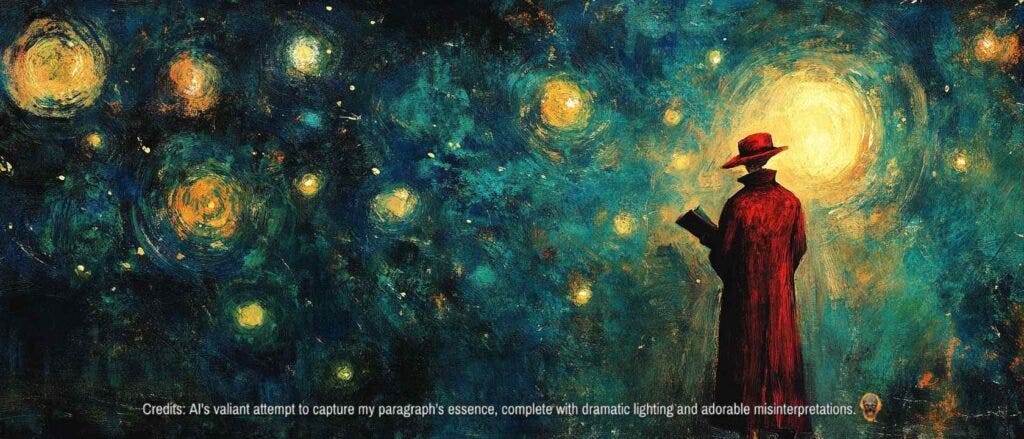Spiritual frauds multiply faster than rabbits on aphrodisiacs.
The marketplace bursts with enlightenment peddlers hawking spiritual snake oil to desperate seekers. Their wares promise transformation while delivering empty platitudes wrapped in exotic terminology.
Picture the scene: meditation retreats where investment bankers sit cross-legged in designer yoga pants, chanting Sanskrit they can’t pronounce, following gurus who’ve mastered one thing – extracting cash from wallets. These spiritual celebrities perfect their serene smiles for Instagram while their assistants handle the messy business of counting money and managing their brands.
The internet has turned spiritual awakening into a commodity, available with one-click purchasing and satisfaction guaranteed. Social media platforms overflow with self-proclaimed masters whose deepest insight arrived during a weekend workshop they paid too much for.
This spiritual fast food leaves seekers fat with concepts but starving for truth…
…while the cosmic cash register keeps ringing.
The Ego’s Ultimate Coup
Your ego would kill to be called enlightened.
Nothing satisfies the self-concept more than crowning itself as transcendent of itself. It’s the perfect crime – the ego claims to have vanished while secretly running the entire operation.
Consider what happens when someone believes they’ve “awakened”: they develop a new identity, more special than their old one. They speak with authority about matters beyond words. They position themselves as knowledgeable, perhaps even as teachers. Their spiritual resumé gets updated with the ultimate credential. Yet this entire process – the claiming, the knowing, the special status – requires an “I” to experience and announce it. The very declaration “I am awakened” contains its own refutation.
The true nature of awakening involves seeing through the self, not giving it a promotion. Real awakening isn’t an achievement for your spiritual trophy case. It’s more like discovering you’ve been a character in someone else’s dream.
When you hear someone proclaim their enlightenment, what you’re witnessing is identity theft of the highest order…
…the thief and victim share the same address.
The Meaningless Label
“Awakened” means everything and nothing at all.
The term has been stretched beyond recognition, applied to experiences ranging from pleasant meditation sessions to psychedelic trips to moments of intellectual clarity. Without definition, it’s useless as communication.
Jack attends a weekend retreat where he feels blissful sensations during meditation. He returns home declaring himself “awakened.” Louise reads several non-duality books and grasps the concept intellectually. She too claims “awakening.” Michael has a profound psychedelic experience where his sense of self temporarily dissolves. He joins the “awakened” club. These experiences differ in kind, not just degree. They’re as comparable as a photograph of food, the smell of food, and actual nutrition.
The spiritual marketplace thrives on this ambiguity. Vague terminology creates a perfect environment for delusion and deception to flourish. Without clear definitions, anyone can claim anything and no one can definitively challenge it.
If someone tells you they’re “awakened,” they’ve told you precisely nothing about their actual experience…
…except their fondness for empty labels.
The State Versus Trait Confusion
Peak experiences aren’t permanent transformations.
Most self-proclaimed awakenings represent temporary states mistaken for permanent traits, like confusing a vacation for a permanent address change. This fundamental error fuels the spiritual marketplace.
Mark experienced a profound meditation retreat where his sense of self dissolved completely. For three days, he lived in boundless awareness, free from identification with thought. He returned home, declared himself “awakened,” and started teaching others. Two months later, when his partner left him, Mark spent weeks consumed by jealousy, anger, and self-pity – emotions requiring a solid sense of self to function. Yet he maintained his awakening narrative, explaining away the contradictions.
States fade. The mind returns to its baseline. The error lies in building an identity around a temporary experience, then defending that identity against contradicting evidence. The gap between claimed attainment and lived reality creates cognitive dissonance that must be resolved – truth makes a convenient sacrifice.
The awakening that requires maintenance, protection, or replenishment isn’t awakening at all…
…it’s just another experience come and gone.
The Self-Deception Machine
Your mind lies to you with perfect conviction.
Self-deception operates with such efficiency that its products appear as unquestionable truth, especially in domains where verification proves impossible. Spiritual attainment tops the list of unverifiable claims.
Consider how people convince themselves of ordinary delusions: the mediocre employee who believes they’re underappreciated, the unfaithful partner who justifies their betrayal, the investor who ignores evidence contradicting their financial theories. These everyday self-deceptions operate through familiar mechanisms – selective attention, confirmation bias, rationalization. Now apply these same mechanisms to spiritual experiences, where the stakes include cosmic significance and the validation metrics remain subjective.
The mind desperately wants to believe it has arrived, that its search has ended, that it possesses special knowledge. This desire creates a perfect storm for self-deception. The more desperately someone wants awakening, the more likely they’ll convince themselves they’ve found it. Spiritual communities often reinforce these delusions through mutual validation, creating bubbles of shared fantasy.
The mind that declares itself free from delusion performs the ultimate magic trick…
…making its biggest deception invisible to itself.
The Spiritual Profit Motive
Enlightenment sells better than sex or weight loss.
The financial and social incentives for claiming awakening create a marketplace where authenticity becomes the first casualty. Being seen as spiritually advanced confers status, authority, and often substantial income.
The economics work like this: Claim awakening. Gather followers. Monetize through books, workshops, retreats, coaching sessions, merchandise. Create an inner circle of paying devotees. Establish exclusivity through application processes or price points. Rinse and repeat. The entire operation depends on maintaining the perception of special attainment. What happens when someone builds their livelihood on this foundation? They protect the claim at all costs.
Beyond money, the social rewards prove equally compelling. Adoration, respect, authority, sexual access, freedom from normal social constraints – all flow to those perceived as spiritually advanced. These rewards create powerful incentives to claim, believe, and defend awakening narratives, regardless of their truth.
This profit motive doesn’t automatically invalidate every claim, but it demands heightened skepticism…
…especially when the enlightenment comes with a price tag.1
The Verification Impossibility
How do you measure what cannot be measured?
The subjective nature of spiritual experience creates a perfect environment for false claims to flourish. Without objective verification methods, we’re left with testimony and behavior – both highly unreliable indicators.
Imagine two people: one genuinely experiencing no sense of separate self, and another merely claiming this experience convincingly. How would you distinguish them? Speech patterns can be mimicked. Behaviors can be performed. Calm demeanor can be practiced. The genuine article and the skilled impostor appear identical from the outside. Even brain scans showing meditation-induced states tell us nothing about someone’s everyday consciousness when not being measured.
This verification problem extends beyond distinguishing authentic from fraudulent claims. Even honest seekers face it: How do I know my own experience constitutes “awakening” rather than a psychological state I’ve misinterpreted? Without external reference points, the mind labels its own experiences based on expectations, hopes, and conceptual frameworks it has absorbed.
The most honest response to claims of awakening might be radical agnosticism…
…neither accepting nor rejecting what cannot be verified.
The Behavioral Evidence
Actions speak louder than spiritual résumés.
If awakening means anything meaningful, it must manifest in behavior consistent with the claimed realization. This simple test eliminates most awakening claims without further investigation.
Study the scandals plaguing spiritual communities: teachers sleeping with students despite public vows of celibacy; gurus accumulating wealth while preaching detachment; enlightened masters raging at critics or suing former followers; spiritual leaders building authoritarian power structures while speaking of ego transcendence. These behavioral contradictions reveal the gap between claim and reality more effectively than any philosophical argument.
Even without dramatic scandals, subtler inconsistencies emerge: defensiveness when questioned; need for admiration; competitive comparison with other teachers; concern with status and recognition. These behaviors require a functioning ego, the very structure supposedly transcended. The awakened state, if genuine, would manifest as psychological integration and ethical consistency, not compartmentalized awareness that emerges only during teaching sessions.
When someone’s awakening claim contradicts their lived behavior, believe the behavior…
…words are cheap, but actions never lie.
The Ultimate Self-Diagnosis
Truth doesn’t need defenders or salespeople.
Spiritual awakening claims ultimately crumble under their own weight. The very act of claiming special status creates the separation that genuine realization would dissolve.
The real question isn’t whether someone else has awakened. It’s whether you’re still caught in the dream of separation right now. Are you defending a self-image? Are you seeking validation? Are you comparing your spiritual progress to others? Are you building identity around experiences? These questions cut through spiritual materialism and point to what matters: your direct experience in this moment.
The path isn’t about accumulating spiritual credentials or experiences. It’s about seeing through the fundamental delusion of separation. This seeing doesn’t need announcement or recognition. It’s not something you achieve and then market to others. It’s the recognition of what was always already true, before concepts like “awakening” were invented.
True liberation renders the very concept of being “awakened” as meaningful as being awakened from last night’s dream…
…completely irrelevant to what’s happening now.
P.S. If this article triggered your spiritual identity, wait until you see what's happening at NirvanaNuke.com. Enter at your own risk—your comfortable illusions aren't welcome there.













Slaughtering one sacred cow after another. Soon there will be nothing left!!! Ha Ha
The unconditioned/Un-awakened pretending to be Conditioned/Awake.